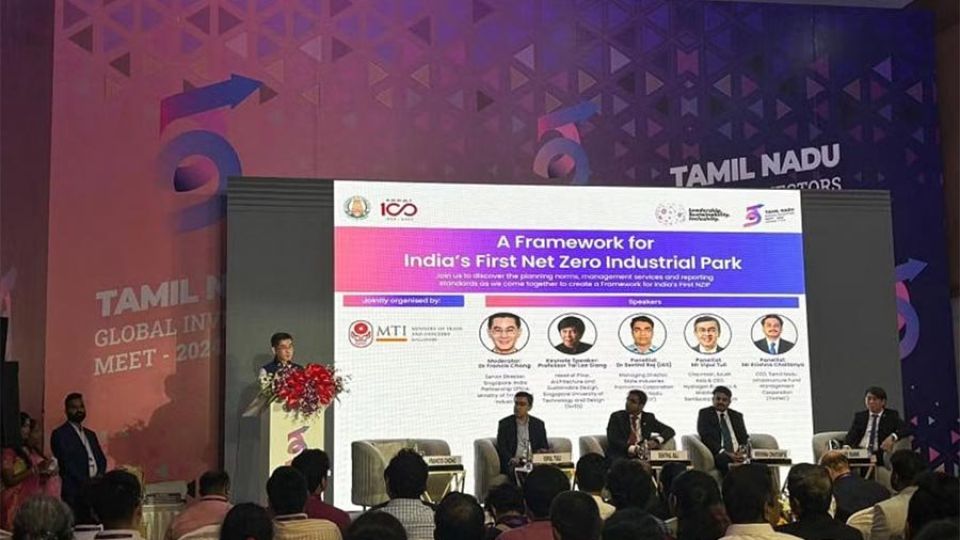January 15, 2024
CHENNAI – The southern Indian state of Tamil Nadu is looking to manufacture electrical vehicles (EVs) and electronics in the country’s first planned net-zero industrial park being set up with Singapore’s help in the state capital Chennai.
A net-zero industrial park is a manufacturing complex where greenhouse gas emissions are kept as close to zero as possible.
The State Industries Promotion Corporation of Tamil Nadu (Sipcot) and the Singapore-India Partnership Office in the Ministry of Trade and Industry (MTI) inked a memorandum of understanding in 2023 to jointly develop the sustainable industrial park.
The agreement was signed during Tamil Nadu Chief Minister M.K. Stalin’s visit to Singapore in May 2023.
The park is still in the planning stages, with both sides jointly creating a framework which officials said will be ready in a year. This will guide every aspect of the running of the park, from how to measure emissions to funding, and identify the exact location from the three earmarked in north Chennai.
Chennai has a strong base in electronics manufacturing with companies like Nokia and Samsung, Dr K. Senthil Raj, managing director of Sipcot, told The Straits Times.
“We thought, let us create (a net-zero industrial park) with an electronics cluster and electrical vehicles. We wanted to be a front runner in developing (such a) park and capitalise on the global movement of cutting down emissions.”
Get exclusive insights into Malaysia in weekly round-up
By signing up, you agree to our Privacy Policy and T&Cs.
Dr Raj said there had been multiple consultations between officials of the two sides in Singapore and Tamil Nadu on the framework, which would determine the level of success of the park.
A panel discussion on “A Framework for India’s First Net-Zero Industrial Park” with speakers from Singapore and Tamil Nadu was held on Jan 7 at the Tamil Nadu Global Investors Meet 2024 in Chennai.
The plan is to provide renewable energy sources and to recycle waste apart from looking at other innovative solutions to reduce emissions, Dr Raj noted.
“We are looking at light industries because it’s easier to establish,” he said, noting that emissions will need to be measured at every step.
Tamil Nadu is India’s most industrialised state with the largest number of factories – 38,837 – accounting for 15 per cent of the factories in the country. Sipcot runs 30 industrial parks across 15,780ha in Tamil Nadu, and is planning 20 more across 18,210ha over the next decade, including the net-zero park. The authorities have not shared the deadline for the completion of the park.
For Singapore, the collaboration underlines the effort to foster sustainable practices not only within its borders but also through international collaborations.
The collaboration includes establishing pilot projects or proof-of-concept projects that incorporate sustainability into master planning, financing, logistics, renewable energy, water and waste management.
An MTI spokesman said Singapore is “excited” to partner Sipcot on the net-zero park. “Sustainability is a key imperative for both Singapore and India,” he noted.
The project, he said, allows Singapore agencies such as national water agency PUB, the Centre for Liveable Cities and JTC Corporation to share experiences and exchange ideas with their Tamil Nadu counterparts.
“Singapore companies also have developed expertise which we can leverage,” said the spokesman, noting this included expertise in master planning and urban solutions. Some areas of collaboration include sustainable water management, waste management, renewable energy, monitoring technologies and landfill management, he added.
Still, the net-zero park may have its challenges. “The key challenge itself is bringing a holistic framework which will be acceptable to all the players like the government, investors, allottees (companies), buyers,” said Dr Raj.
The Tamil Nadu government is hoping that a key attraction for industries would be that net-zero products will have added value in overseas markets.
India has made commitments, like other countries, to cut down emissions and reach the net-zero emission target by 2070. It has committed to cutting down carbon emission by one billion tonnes by 2030.
Across the country, green initiatives are coming up, from sustainable business parks to the world’s largest green energy park in the Rann of Kutch desert in Gujarat. The energy park is being built by Indian conglomerate Adani Group, run by Indian billionaire Gautam Adani.
However, economist Arvind Subramanian, a former chief economic adviser to the Indian government, noted that the success of the net-zero park will depend on whether companies think it makes for an attractive investment.
“What are the terms of this investment? What are the kind of institutional guarantees that you are going to give an investor?” he said.
“I feel industrial parks are a small initiative to be done. It doesn’t really address the bigger issue of making the whole state go green.”
Tapping renewable sources of energy has been a key aim of the Tamil Nadu government. The state had an installed wind energy capacity of 10,248MW as at August 2023. The western state of Gujarat ranks top with 11,063MW.
Tamil Nadu ranks fourth in solar power capacity with 6,750.62MW.
Professor Tai Lee Siang, head of pillar for architecture and sustainable design at the Singapore University of Technology and Design, noted that sustainability has to be a criterion for further growth in any country. “The net-zero industrial park framework allows the development of a transparent and accountable guidance for the establishment of a truly sustainable engine of growth and model for the future evolution of industry growth,” he said.


